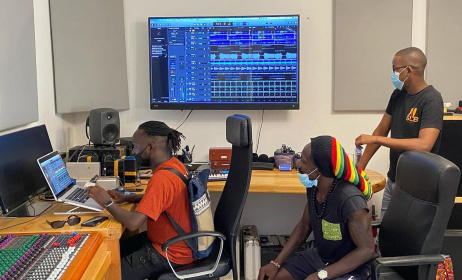How Ngunjiri became a trailblazing act
The music business in Kenya underwent a major transformation in the late 1990s. A new generation of young musicians was just arriving on the scene influenced by the global trends that swept in a wave of fresh urban sounds.
The opening up of the country's first FM radio stations meant that there was a lot more space on the airwaves for the promotion of homegrown music than had been the case on the state-run stations. The artist at the vanguard of the emerging music trends was Harrison Ngunjiri Maina, known by the stage name Hardstone, your typical Nairobi youth, raised in the city’s Eastlands and influenced mainly by American rap music and Jamaican dancehall from artists like the legendary Yellowman.
Born in August 1977, Ngunjiri started composing rhymes as a 12-year-old growing up first in Dandora Estate and then in Jericho Estate. While at Uhuru High School, he was chief entertainer for the student community and got his first taste of the big stage when he performed at the singing competitions held at the New Florida Night Club.
When he completed school in 1995, Ngunjiri met producer Ted Josiah who had spotted him performing at the Braeburn Theatre the previous year. "He wrote a note and gave it to a friend of mine saying he wanted to see me urgently at the Sync Sound Studios on Mombasa Road where he was working as a producer," Ngunjiri recalls.So when the budding artist met his future producer in the studio in early 1996 Ted knew that while there was abundant talent in the young man he was still rough around the edges and required plenty of production before he was unleashed onto the public. Meanwhile, Ngunjiri became Hardstone, a name he says he was first called by a Jamaican who saw him perform at a Nairobi club.
His association with Ted Josiah who had emerged from the gospel group Hart to become one of the hottest young producers in the country resulted in the groundbreaking album Nuttin' but the Stone in 1997. The recording was mastered to the highest digital standards even though the CD format was still relatively new in the country and most fans snapped up cassette copies instead. It was released internationally by the German record label, Kelele. The popularity of the album came down to one song, ‘Uhiki’, a rendition of a traditional Kikuyu wedding song, played over the beat of Marvin Gaye’s ‘Sexual Healing’ which became an instant hit thanks to constant rotation on the new radio stations, Metro FM and Capital FM.
Hardstone’s crowning moment came at the 1997 Kisima Awards at the Carnivore in Nairobi, when he was named Best New Artist. David Muriithi who managed the artist at the time remembers him as a very shy character who transformed only when he began his performance. “He became a total animal once the microphone was in his hand and he jumped on stage. Most people don’t know that he had a black belt in Karate which explains why his energetic performances sometimes felt like a fitness workout,” says Muriithi.
“What I really liked about him was his discipline and humility. Despite being subjected to a hectic schedule of appearances and studio work, he was always on time arriving at least 15 minutes ahead of schedule. A rare trait among artists," Muriithi adds.
His success landed him shows with some of the biggest names in the music business at the time. Multiple Grammy Award winner Lauryn Hill, who was then riding high as a member of The Fugees, appeared as the opening act during the launch of Hardstone’s CD at the Impala Floodlit Rugby tournament in 1997. During the same year he also performed alongside American rapper Coolio and the Jamaican duo of Chaka Demus & Pliers during their East African tour.
As part of an endorsement deal with film manufacturer, Konica Camera in 1997, Hardstone’s first video was shot by an Italian director and launched at the Carnivore. 'Uhiki' also found its way on to an international compilation album African Groove, released by World Music record label, Putumayo. In 1998, Hardstone met an American exchange student Cheryl Cooper in Nairobi and migrated to the US, where the two had a short-lived marriage that ended in divorce three years later. He has continued performing and recording and worked on collaborations with another famous Kenyan group resident in the U.S, Jabali Africa
Hardstone was the pioneer of the 1990s urban sound combining African rhythms with Jamaican reggae and American hip hop. He blazed the trail for a whole host of acts like Kalamashaka, Gidi Gidi Maji Maji, Poxi Presha and Necessary Noize who emerged in his wake. David Muriithi says Hardstone’s career is far from over: "He is reinventing himself and he will surprise everyone by coming back on the scene even stronger than before.”
True to David Muriithi’s words, Hardstone created Stone Island Entertainment, an independent record label. On 9 March 2015, he landed a recording deal with Atlantic Records, making him the first East African to sign for the label.
Originally published in the Daily Nation(link is external) on 28 October 2013





























Commentaires
s'identifier or register to post comments